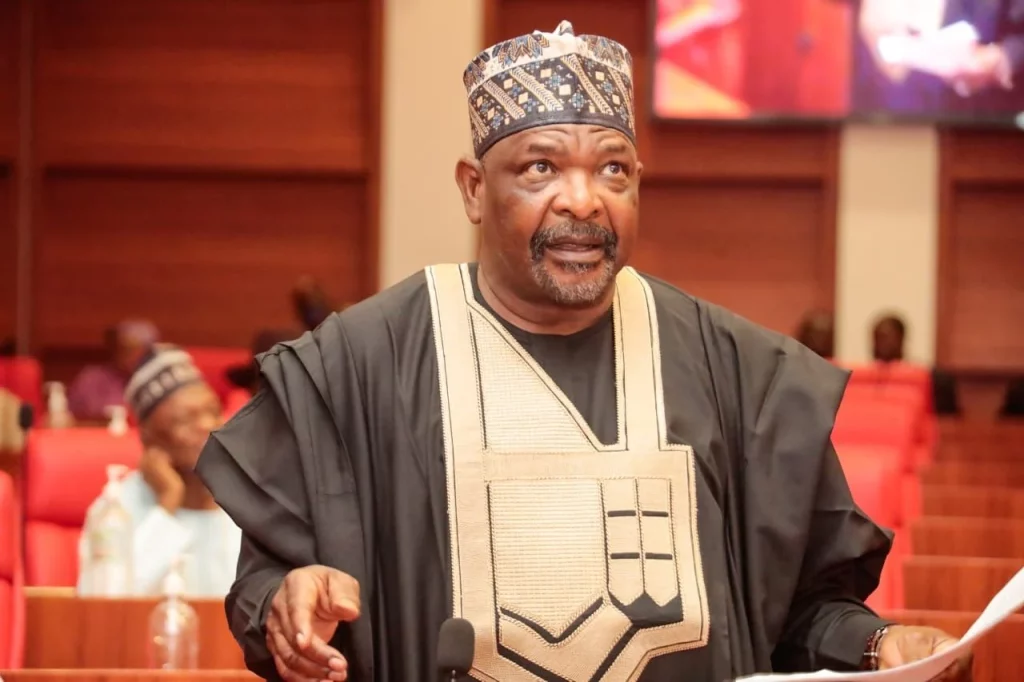On March 12, 2024, the Senate imposed a three-month suspension on Senator Abdul Ningi (PDP, Bauchi Central) following his accusation that the 2024 budget had been inflated by N3 trillion.
Senator Ningi, who was then the Chairman of the Northern Senators Forum, had raised an allegation three days prior. It was expected that this issue would be the central topic of discussion in the opening plenary session on March 12th, which marked the first legislative meeting day.
As anticipated, the topic took precedence and led to an extensive and heated debate that lasted for several hours. Finally, the Senate decided to suspend him.
The suspension raises critical questions about the balance between maintaining legislative order and ensuring transparency within one of the nation’s highest democratic institutions.
Senator Ningi‘s claims of budget padding spotlight the delicate issue of fiscal responsibility and the public’s right to be informed about their government’s financial dealings. The swift suspension, without a thorough investigation or a formal disavowal of his claims, might be seen as an attempt to silence dissent and could undermine the Senate’s credibility.
In Nigeria, budget padding is not explicitly defined under a specific law, but it can fall under various forms of financial misconduct or fraud as per the country’s legal framework. The allegations of budget padding often lead to calls for an investigation by anti-corruption agencies such as the Economic and Financial Crimes Commission (EFCC) and the Independent Corrupt Practices and Other Related Offences Commission (ICPC).
The controversy surrounding budget padding involves the unauthorised inflation of budget figures or the inclusion of projects without clear execution plans. Such actions, if proven, could be considered a breach of public trust and a misuse of office, which are punishable under various anti-corruption laws in Nigeria.
For instance, the Fiscal Responsibility Act of 2007 mandates transparency and accountability in the nation’s fiscal operations. The act aims to prevent and penalize unlawful conduct in budgetary processes. Additionally, the Public Procurement Act of 2007 provides guidelines to ensure integrity and efficiency in the procurement process, which could be relevant in cases of budget padding where procurement rules are circumvented.
Budget padding has been a persistent issue in Nigeria’s governance. In 2021, the budget was marred by accusations of padding, with the National Assembly allegedly inflating allocations by over N500 billion. Among the questionable allocations were funds earmarked for ambiguous purposes, such as “empowerment for selected young ladies and girls in Nsukka, Enugu State,” and “provision of empowerment materials to youths in some selected states in the north-east.”
Already, a national newspaper has uncovered over N53 billion worth of vague projects in the 2024 budget passed by the National Assembly, drawing attention to the prevalence of ambiguous allocations lacking specific locations.
These instances highlight the need for greater transparency and accountability in Nigeria’s budgetary practices to ensure that public funds are allocated and utilized effectively for the benefit of the citizens.
Transparency is a cornerstone of democracy, and the Senate, as a representative body, must uphold this principle. If Senator Ningi’s allegations have any basis, the appropriate response would be an open inquiry to either confirm or refute his claims, thereby demonstrating the Senate’s commitment to accountability.
The lack of investigation before the suspension could be perceived as a missed opportunity to reinforce trust in the legislative process. It raises concerns about whether the Senate’s decision was a justifiable measure to preserve its integrity or a hasty move that could inadvertently shield potential irregularities from scrutiny.
While maintaining order within the Senate is essential, it should not come at the expense of transparency and due process. The pursuit of truth and the willingness to address uncomfortable allegations head-on is what ultimately strengthen the foundations of any democratic institution.
